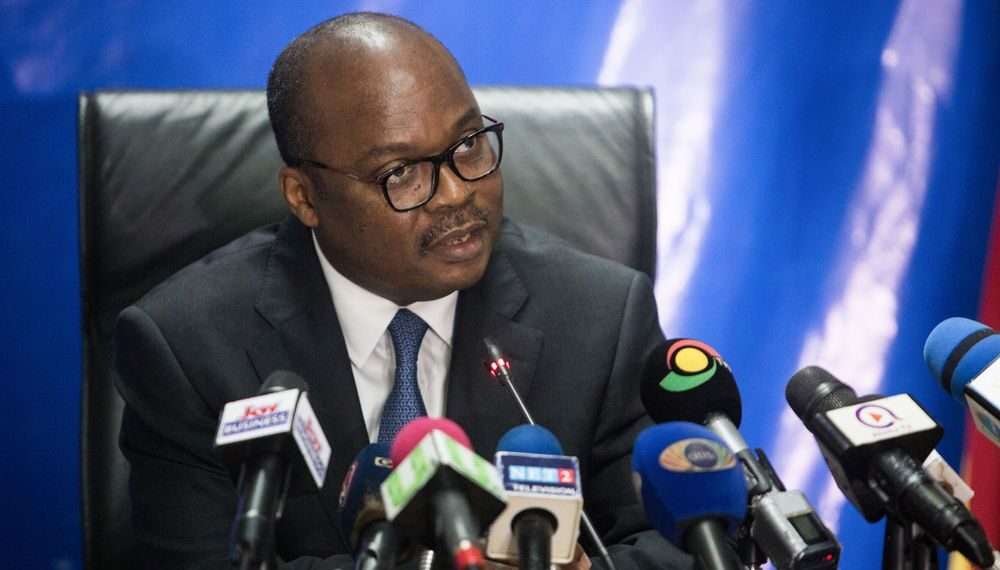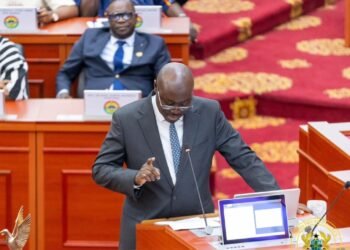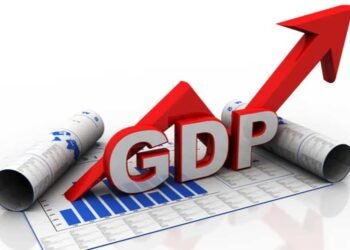The Bank of Ghana (BoG) has described Togbe Afede’s comments on the relationship between debt and interest rates as “spurious” and “oversimplification” of relationships.
According to the BoG, the UK and Ghana have different macro-economic conditions and should not, at any point in time, be compared.
BoG explained that the conduct of monetary policy in a developing country on a disinflation path can be starkly different from the conduct of monetary policy in jurisdictions where inflation is in its steady state. BoG averred that for a good part of Ghana’s history, inflation has been in double digits whereas in the UK inflation is below 2 percent and even dipped to negative territories at some point.
“The assertion that the UK Government is more indebted than the Government of Ghana using metrics such as debt-to-GDP ratio and debt per capita and yet, the rate at which the Bank of England lends to banks is 0.1 percent, while the rate at which the Bank of Ghana lends to banks in Ghana is 13.5 percent again amplifies the point of a poor choice of comparator, and also demonstrates the oversimplification of the relationship between debt and interest rates”.
Bank of Ghana
This was contained in a statement issued by the research department of the Bank of Ghana in response to a recent article published on JOY FM online platform (myjoyonline.com) with the caption: “Bank of Ghana has lost focus”. In the said article, Togbe Afede XIV, Agbogbomefia of the Asogli State, was reported to have raised several issues about Bank of Ghana’s conduct of monetary policy and its governance structure.
The Bank of Ghana explained that even though it does not respond to comments on the conduct of monetary policy because various stakeholders may have different opinions, it was forced to respond this time around, “given the profile of Togbe Afede XIV in the society”.
“The headline debt-to-GDP number completely misses the fine details unless we look at other debt indicators such as the debt service costs. In fact, it is the debt service cost that determines the immediate impact of high debt on the fiscal and its ultimate crowding out effect. And in this case, let us draw the author’s attention to the difference between the UK and Ghana. While the Overall General Government Gross debt to GDP ratio is 108.5 percent in UK and 83.5 percent in Ghana, the debt service cost in UK is about 5 percent of total fiscal revenues and translates to about 2 percent of GDP”.
Bank of Ghana
Clarifications on high debt costs
The BoG highlighted that Ghana’s debt service cost, on the other hand, is about 79 percent of total revenue and about 10 percent of GDP. Per BoG’s statement, “this is where the incidence on the fiscal is critical and why the Government of Ghana will have to pay a higher interest rate to borrow to service debt compared to the UK”.

The interest rate floor of the policy corridor, according to BoG, are completely different for the two economies. According to the BoG, this explains why the rate at which the Bank of Ghana’s Monetary Policy rate will be effective in helping manage liquidity and achieve the price stability objective, is constrained by the debt service cost and public sector borrowing requirement dynamics on interest rates.
“It is therefore, completely erroneous and misleading and spurious analysis to simplify the monetary policy stances comparison with just the overall debt-to-GDP comparison of two completely different economies with different fundamentals”.
Bank of Ghana
UK debt is highly printable
Detailing other perspectives in context to show why the analysis in the said article can at best be “generously described as spurious”, the BoG underscored that the UK debt is highly printable because the Pound Sterling, “as we all know, is a reserve currency”.
“This means that other sovereigns and central banks are keen on holding such assets as part of their reserves. For this very reason, the UK Government is able to issue debt at a lower cost to support monetary policy conduct. This argument does not hold for only the Pounds Sterling but for all SDR basket of currencies like the USD, JPY, the Euro etc etc. The Ghana Cedi is not yet convertible even in the sub region and let alone considered as a reserve currency. What this means is that in order to attract inflows Ghana will have to pay a premium, resulting in the issuance of debt at a higher cost”.
Bank of Ghana
The BoG noted that Debt comparisons will also have to be done taking into consideration the components of the debt. According to the Bank, about 18.1 percent of Ghana’s domestic debt stock is held by nonresidents, while the total non-resident holdings of the public debt constitute about 57.3 percent of total public debt.
“As at September 2021, the foreign currency denominated debt component of the total debt stock stood at 48.7 percent. Given these facts, the profile of our public debt stock is highly sensitive to movements of the exchange rate and would require higher interest rates to maintain exchange rate stability to guarantee debt sustainability”.
Bank of Ghana
Expressing dismay, the BoG stated that an assessment of the performance of an Inflation Targeting Central Bank should have rather focused on inflation as the basis. Even though BoG described Inflation as a “cancerous animal” that hurts the poor the most, it bemoaned the fact that “nowhere in the said article was inflation mentioned as a key factor determining the level of interest rate in the economy”.
READ ALSO: Milo Names Provisional Squad For 2021 Africa Cup Of Nations























